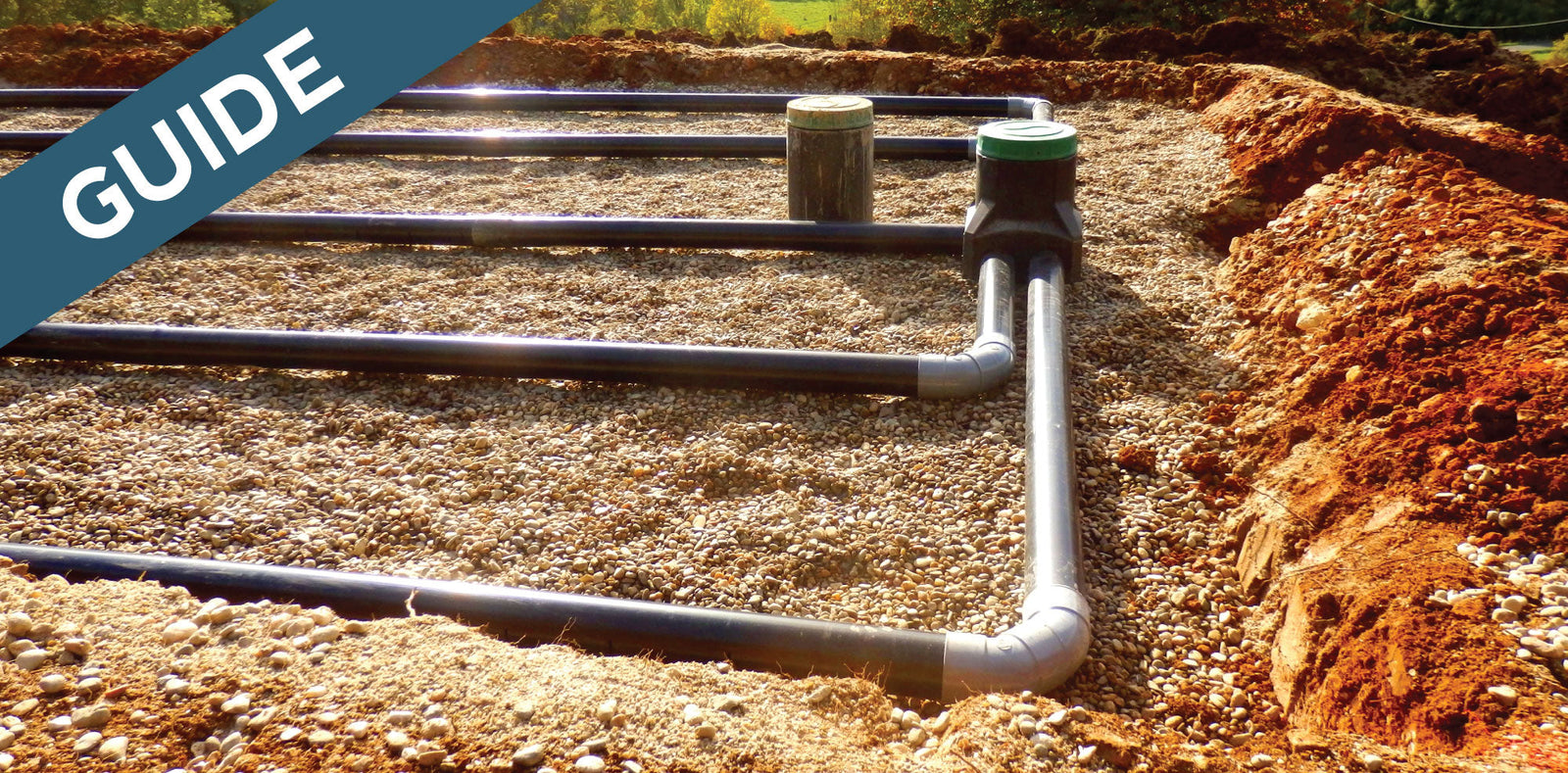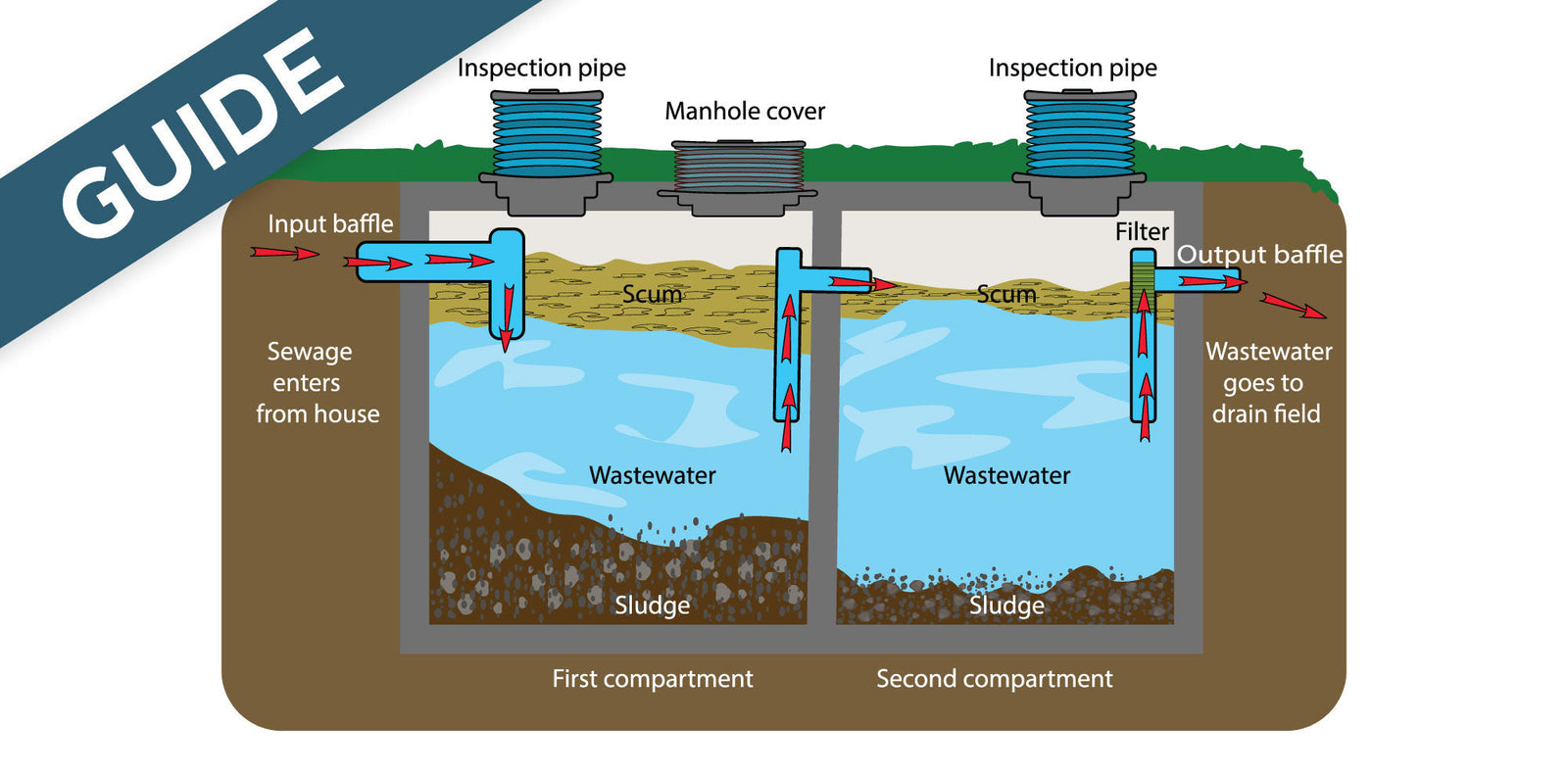Key Points:
- The average lifespan of a septic system is 20-30 years, but this number can vary drastically depending on septic usage, the type of components used in the system, and the maintenance practices you use.
- In most cases, the leach field is the first component of your septic system that will fail. Generally, you can avoid leach field failure by 1) having the piping properly installed (if applicable), 2) making sure the soil percolation rate of your leach field is adequate, and 3) not overloading your system with excessive use.
- Another septic system component that might fail is your septic tank. Concrete and plastic tanks tend to last longest (40+ years if pumped regularly), while steel tanks tend to rust, lasting only 15-20 years on average.
- The best way to ensure that your septic system lasts for many years is to properly maintain your system. Proper maintenance includes 1) pumping your tank regularly, 2) conserving water, 3) protecting the area where your septic system is located, 4) not allowing chemicals, greases, or anything not biodegradable to enter your system, and 5) using a bacterial enhancing septic product like Unique Septic System Digester.
- The cost to replace your leach field will vary between $3000-$10,000, the cost to replace your septic tank can be between $3000-$6000, and the cost for an entirely new septic system can be upwards of $15,000.
If you have a home septic system, you’ve probably wondered how long a septic system will last. And, if you do need to replace your septic system, what is the cost? Well, we’re here to set your mind at ease and give you all the information you’ll need to understand the lifespan of your septic system and the costs of replacement.
Septic System Lifespan
On average, a septic system will last for about 20-30 years. With that said, the lifespan of a septic system depends on many factors. The 20-30-year figure assumes that the septic system has been 1) well designed and built, 2) properly-maintained, and 3) never overloaded with waste.
When factoring in these variables, it's difficult to place a hard and fast number on how long a septic system will last. Some systems last only 20 years before they begin to have problems and/or need to be replaced, while other systems (in rare cases) can last upwards of 40 years!
The Leach Field
In all likelihood, the first component of your septic system that will fail is your leach field. Oddly enough, a leach field’s size is based on the bedrooms of your home, assuming that 2 people live in each bedroom. For example, a 4-bedroom home will have a leach field sized for 8 people.
In general, a leach field that receives light use will last much longer than one that is consistently strained by excessive use. For instance, if only 2 people live in a 4-bedroom home, the leach field will most likely last much longer than if 4 people lived in the home.
Beyond how often it's used and its size, a leach field’s life also depends upon the rate of percolation in the soil where the leach field is located. If it was installed correctly, the leach field’s piping will allow wastewater to permeate (or "leach") into the surrounding soil at the appropriate rate. If your leach field was not installed correctly, or the soil is not adequately permeable, you may begin to see issues with clogs and backups.
The Septic Tank
Another crucial component of your septic system that will effect its life-expectancy is the septic tank itself. A properly built, concrete septic tank can last for upwards of 40 years, and plastic tanks, assuming the components are not damaged, can last for about as long. On the other hand, a steel tank will rust away, lasting only 15-20 years (or less) on average. Because of this, it's recommended that you choose a concrete or plastic septic tank!
Proper Maintenance
Much of the information covered above is outside of your control, assuming that your septic system is already installed. But don’t worry! In large part, proper maintenance of a septic system is one of the best ways to ensure that it lasts a long time, which means that the life of your septic system is largely dependent upon you! There are a number of things you can do to increase the life of your system:
- Pump your septic tank periodically. Not pumping your septic tank will result in clogs, backups, and costly repairs. How often you pump your septic tank will vary depending on your usage and the size of the tank. However, as a general rule, it’s a good idea to get your system pumped every 2-5 years.
- Conserve water. Using less water reduces the load on your septic system’s leach field.
- Protect the area where your septic system is located. Do not drive, park, or otherwise place anything heavy on your leach field. The weight of these items will damage the PVC pipes that make up your leach field. Beyond this, make sure to direct any runoff rainwater away from your leach field. If rain water is allowed to collect in the area of your leach field, the soil can become saturated, which will prevent wastewater from absorbing into the soil, which can cause backups in your system. Finally, do not plant large bushes or trees on your leach field, and keep surrounding plants with complex root systems at a safe distance. The tough roots of these plants and trees can damage the components of your system.
- Avoid putting chemicals, greases, or, in general, anything that won’t easily biodegrade down your drains. You should also only flush toilet paper and waste down your toilets. Anything else can become stuck in the plumbing or not break down once its in your septic tank.
- Use a bacteria-enhancing septic product like Unique Septic System Digester. A bacteria-enhancing septic product will increase the efficiency of your septic tank in breaking down waste, which will improve the overall function of your system and increase its life. Septic System Digester uses a proprietary, 8-strain blend of scientifically selected bacteria that maximize the breakdown of the waste found in a septic system. Not all bacteria are created equal, and we make sure to use only the best!
The Cost of Replacing a Septic System
While there are certain factors that can make a septic system last longer, every system will eventually need to be repaired to replaced. For instance, if you have purchased a home with a 40-year-old septic system, you may want to consider replacing the system soon. 40 years is a long time for a septic system to function without being replaced!
There are some signs of a failing septic system to watch out for:
- Slow drainage inside your home.
- Clogs and backups on the lower floors of your home.
- Water-logged areas in your leach field or sewage smells.
Certain locations require that a home have a designated area where a replacement leach field can be built (assuming the septic tank is still in good condition). If this is the case, you can expect to spend roughly $3000-$10,000 to replace your leach field. However, if you need a septic tank replacement, you should budget for an additional $3000-$6000. Finally, if you need an entirely new septic system, the cost can be upwards of $15,000.
We realize those are some pretty hefty costs! The basic takeaway should be that it’s much easier to take care of a septic system—extending its life as much as possible—than to replace it! Proper maintenance is definitely your best option when trying to increase your septic system’s lifespan.
Conclusion
By its very nature, a septic system is a finite piece of engineering. In other words, it's not designed to last forever! Eventually, it will need to be replaced, so it's a good idea to know how old your system is and how much it can cost to replace it. (For more in-depth information about the cost of a septic system, check out this article by touching or clicking here.) But with that being said, the absolute best thing you can ever do for your septic system is to properly maintain it. Not only will this add many years of life to your system, but it will help you avoid frustrating, costly, and time-consuming repairs.
We hope that this article has been helpful as you navigate these waters! If you have any further questions or concerns after reading this article, please reach out to us at support@uniquemm.com! We’re always more than happy to help!





